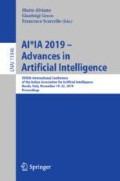Abstract
Epistemic answer set programming (\(\mathsf {EASP}\)) is a recent epistemic extension of answer set programming (\(\mathsf {ASP}\)), endowed with the epistemic answer set (EAS) semantics. EASs propose a straightforward generalisation of ASP’s original answer set semantics. Moreover, they provide intended results both for cyclic and acyclic programs, possibly containing arbitrary constraints. Epistemic here-and-there logic (\(\mathsf {EHT}\)) is also a recent epistemic extension of a well-known nonclassical logic called here-and-there logic (\(\mathsf {HT}\)), which is intermediate between classical logic and intuitionistic logic. In this paper, we discuss a strong equivalence characterisation for \(\mathsf {EASP}\) programs, which is identified on \(\mathsf {EHT}\).
Access this chapter
Tax calculation will be finalised at checkout
Purchases are for personal use only
Notes
- 1.
In \(\mathsf {ASP}\), constraints function to rule out answer sets violating them or they have a neutral effect.
- 2.
\(\texttt {s}[\mathcal A]\) represents the image of \(\mathcal A \subseteq 2^{\mathbb {O}\text {-}\textit{Lit}}\) under \(\texttt {s}\), and \(\texttt {s}(A)\) represents the value of \(\texttt {s}\) at \(A \in \mathcal A\).
- 3.
\(\texttt {EAS}(\varPi )\) denotes the set of all epistemic answer sets (EASs) of an \(\mathsf {EASP}\) program \(\varPi \).
References
Fariñas del Cerro, L., Herzig, A., Su, E.I.: Epistemic equilibrium logic. In: Yang, Q., Wooldridge, M. (eds.) Proceedings of the 24th International Joint Conference on Artificial Intelligence, pp. 2964–2970. AAAI Press (2015). http://ijcai.org/papers15/Abstracts/IJCAI15-419.html
Ferraris, P.: Answer sets for propositional theories. In: Baral, C., Greco, G., Leone, N., Terracina, G. (eds.) LPNMR 2005. LNCS (LNAI), vol. 3662, pp. 119–131. Springer, Heidelberg (2005). https://doi.org/10.1007/11546207_10
Gelfond, M.: Strong introspection. In: Dean, T.L., McKeown, K. (eds.) Proceedings of the 9th National Conference on Artificial Intelligence, Anaheim, CA, USA, 14–19 July 1991, vol. 1, pp. 386–391. AAAI Press/The MIT Press (1991)
Gelfond, M.: Logic programming and reasoning with incomplete information. Ann. Math. Artif. Intell. 12(1–2), 89–116 (1994)
Gelfond, M., Lifschitz, V.: The stable model semantics for logic programming. In: ICLP/SLP, vol. 88, pp. 1070–1080 (1988)
Heyting, A.: Die formalen Regeln der intuitionistischen Logik. Sitzungsber. Preuss. Akad. Wiss. 42–71, 158–169 (1930)
Lifschitz, V., Pearce, D., Valverde, A.: Strongly equivalent logic programs. ACM Trans. Comput. Log. 2(4), 526–541 (2001). https://doi.org/10.1145/383779.383783
Pearce, D.: A new logical characterisation of stable models and answer sets. In: Dix, J., Pereira, L.M., Przymusinski, T.C. (eds.) NMELP 1996. LNCS, vol. 1216, pp. 57–70. Springer, Heidelberg (1997). https://doi.org/10.1007/BFb0023801
Pearce, D.: Equilibrium logic. Ann. Math. Artif. Intell. 47(1–2), 3–41 (2006)
Shen, Y., Eiter, T.: Evaluating epistemic negation in answer set programming. Artif. Intell. 237, 115–135 (2016). https://doi.org/10.1016/j.artint.2016.04.004
Simpson, A.K.: The proof theory and semantics of intuitionistic modal logic. Ph.D. thesis, University of Edinburgh, College of Science and Engineering, School of Informatics, November 1994
Su, E.I.: Extensions of equilibrium logic by modal concepts. (Extensions de la logique d’équilibre par des concepts modaux). Ph.D. thesis, Institut de Recherche en Informatique de Toulouse, France (2015). https://tel.archives-ouvertes.fr/tel-01636791
Su, E.I.: Epistemic answer set programming. In: Calimeri, F., Leone, N., Manna, M. (eds.) JELIA 2019. LNCS (LNAI), vol. 11468, pp. 608–626. Springer, Cham (2019). https://doi.org/10.1007/978-3-030-19570-0_40
Wang, K., Zhang, Y.: Nested epistemic logic programs. In: Baral, C., Greco, G., Leone, N., Terracina, G. (eds.) LPNMR 2005. LNCS (LNAI), vol. 3662, pp. 279–290. Springer, Heidelberg (2005). https://doi.org/10.1007/11546207_22
Author information
Authors and Affiliations
Corresponding author
Editor information
Editors and Affiliations
Rights and permissions
Copyright information
© 2019 Springer Nature Switzerland AG
About this paper
Cite this paper
Su, E.I. (2019). Strongly Equivalent Epistemic Answer Set Programs. In: Alviano, M., Greco, G., Scarcello, F. (eds) AI*IA 2019 – Advances in Artificial Intelligence. AI*IA 2019. Lecture Notes in Computer Science(), vol 11946. Springer, Cham. https://doi.org/10.1007/978-3-030-35166-3_8
Download citation
DOI: https://doi.org/10.1007/978-3-030-35166-3_8
Published:
Publisher Name: Springer, Cham
Print ISBN: 978-3-030-35165-6
Online ISBN: 978-3-030-35166-3
eBook Packages: Computer ScienceComputer Science (R0)

